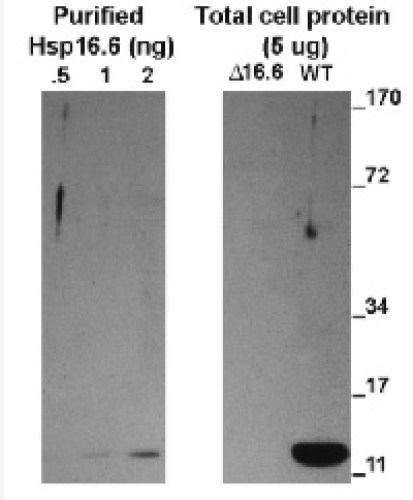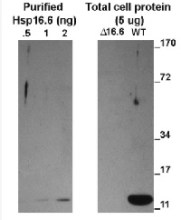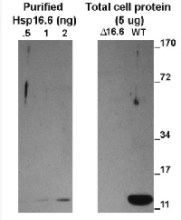
Anti-HSP16,6 | Class I heat shock protein 16,6 (cytosolic)
(Cat#: AS08 286)


Description
- Immunogen: Recombinant protein. Synechocystis PCC 6803 Hsp16.6 CI (class one) UniProt: P72977
- Host: Rabbit
- Clonality: Polyclonal
- Purity: Serum
- Format: Lyophilized
- Quantity: 50 µl
- Reconstitution: For reconstitution add 100 µl of sterile water
- Storage: Store lyophilized/reconstituted at -20°C; once reconstituted make aliquots to avoid repeated freeze-thaw cycles. Please remember to spin the tubes briefly prior to opening them to avoid any losses that might occur from material adhering to the cap or sides of the tube.
- Tested applications: Western blot (WB)
- Recommended dilutions: 1 : 5000 (WB)
- Expected | apparent MW: 16.6 kDa
- Confirmed reactivity: Synechocystis sp. PCC 6803
- Not reactive in: No confirmed exceptions from predicted reactivity are currently known
- Hsp16.6 belongs to a family of class I of a small heat shock proteins. They are induced once a cell is stressed by an increased temperature. Synechocystis Hsp16.6 is involved in the development of thermotolerance and thylakoid stability. The way small hsp proteins are protecting a living cell are not fully understood. They seem to be involved in chaperone functions by protecting other proteins from irreversible denaturation.
- Gunnelius et al. (2014). The omega subunit of the RNA polymerase core directs transcription efficiency in cyanobacteria. Nucleic Acids Res. 2014 Jan 29.
- On a gradient gel Hsp16.6 runs closer to 11 kDa
Boca Scientific is your premiere source for high-quality, innovative solutions for Cell Biology, Molecular Biology, Immunology, genetics and other lab products and reagents. We bring leading-edge products from our own-line and around the world to laboratories in the US and Canada. Our goal is to offer excellent solutions to drive research and discoveries backed by superior customer support.
